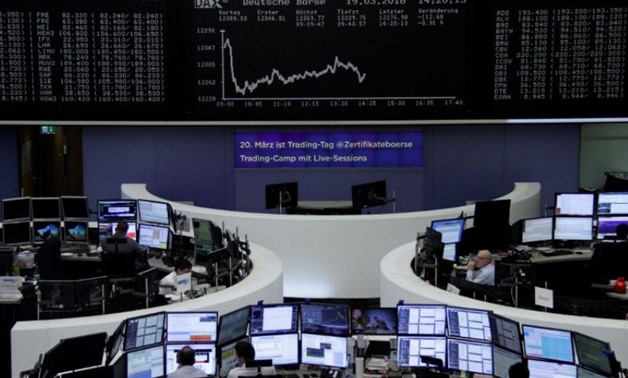
FILE PHOTO: The German share price index, DAX board, is seen at the stock exchange in Frankfurt, Germany, March 19, 2018. REUTERS/Staff/Remote
LONDON- European stocks edged higher on Monday, shrugging off the weekend’s fractious G7 meeting as investors looked forward to an event-packed week while receding tensions in Italy nudged the euro towards a recent three-week high.
President Donald Trump’s rejection of a previously signed communique separates the United States from its traditional global economic allies and underlines trade tensions, though markets have taken the news as yet another theatrical gesture by the U.S. administration.
If anything, markets believe the G7 summit might force policymakers to adopt a cautious stance as two of the world’s top central banks - the U.S. Federal Reserve and the European Central Bank - are set to tighten policy this week.
“Though the latest headlines are definitely not positive for global trade, risk appetite is broadly firm across the board as investors are of the view it might force the ECB and the Fed to take a cautious approach,” said Neil Mellor, a senior currency strategist at BNY Mellon in London.
While stocks wobbled and the dollar edged higher in initial reaction to the G7, which Societe Generale termed as a “mess”, markets quickly recouped losses, with stocks firmer across the board on expectations that any withdrawal in policy stimulus would be very gradual on the backdrop of rising trade tensions.
An MSCI index of European stocks .MSER was up 0.7 percent in early trading, not far from a recent two-week high.
The S&P 500 futures ESc1 were 0.1 percent lower after dropping as much as 0.3 percent in early trading, indicating a firm start for Wall Street.
MSCI's broadest index of Asia-Pacific shares outside Japan .MIAPJ0000PUS slipped early but was last up 0.3 percent. Hong Kong's Hang Seng .HSI also gained 0.3 percent while the Shanghai Composite Index .SSEC fell 0.5 percent.
The Fed is almost certain to raise rates again on Wednesday, inching closer to a neutral policy stance, while the ECB is likely to signal on Thursday that its 2.55 trillion euro bond purchase scheme will end this year, a key move in dismantling crisis-era stimulus.

Comments
Leave a Comment